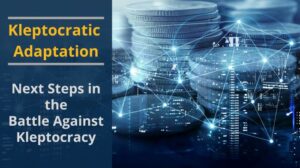A new “alliance of democracy defenders” is imperative to counter the intensifying cooperation among members of a global “autocratic network,” Venezuelan opposition leader and former political prisoner Leopoldo López contends in a new analysis, the Wilson Center reports (above):
Increasingly, their cooperation [aka Autocracy, Inc.] includes military support, the sharing of technology for surveillance and censorship, sanctions evasion, and the transnational harassment of dissidents. Drawing on personal experience and conversations with pro-democracy activists worldwide, López’s report, “Challenging Autocracy from the Front Lines,” argues that the international response to the “autocratic network” must involve greater cooperation among pro-democracy movements and far more robust international support for individuals fighting to restore democracy.
 Lopez proposes a new “alliance for freedom focused on strengthening cooperation among pro-democracy movements by supporting, connecting and advocating for them, with the objective of restoring democracy, free and fair elections and the rule of law.”
Lopez proposes a new “alliance for freedom focused on strengthening cooperation among pro-democracy movements by supporting, connecting and advocating for them, with the objective of restoring democracy, free and fair elections and the rule of law.”
Russia’s war on Ukraine “is a reminder that when pro-democracy activists on the ground are confronting a regime, they face an alliance that is well-equipped and well-funded,. Thus, to confront these regimes, we must present a united front that includes democratic governments, international institutions and pro-democracy activists,” Lopez observes:
All too often, pro-democracy movements do not share information. We do not cooperate. We do not support each other. We constantly seek reasons not to unite. As a result, pro-democracy movements across the globe are disjointed and vulnerable….
A union of pro-democracy leaders can become a valuable source of information about shared struggles. However, this alliance of dissidents must also count on the enthusiastic support of civil society, philanthropic organizations and democratic governments that recognize that it is in their interest to embolden those who fight for liberty. Free nations must regard this struggle as central to their foreign policy, and should not be timid in opposing human rights violations and dictatorship.
The report was launched this week at a Wilson Center discussion (above) with Nadia Oweidat, assistant professor of history & security studies at Kansas State University; Garry Kasparov, chairman of the Renew Democracy Initiative and Human Rights Foundation; and Kyaw Zeyar Win, a Burma technical specialist with the International Republican Institute.
KLEPTOCRATIC NETWORK
 One of the defining features of autocracy is the high level of corruption, notes Lopez. Undisturbed by the rule of law or democratic accountability, regime officials use the
One of the defining features of autocracy is the high level of corruption, notes Lopez. Undisturbed by the rule of law or democratic accountability, regime officials use the
power of the state to enrich themselves and their entourage. In the case of Venezuela, over 20 percent of GDP is reportedly tied to illicit enterprises such as narcotrafficking, smuggling and illegal extraction of gold and minerals. The Maduro regime is among the chief beneficiaries of these practices.
This system, known as kleptocracy, is akin to the internet’s “dark web,” an unregulated environment that enables a wide range of illicit activity. Kleptocracy is often enabled by Western financial tools and practices. It involves real estate, private equity and auction houses, often facilitated by consultants, lobbyists and lawyers in Western countries, he adds, citing Lily Sabol’s “Countering Kleptocracy” report for the National Endowment for Democracy’s International Forum.

National Endowment for Democracy (NED)
López was one of the recipients of NED’s 2015 Democracy Award, which was presented in the U.S. Congress and recognized the sacrifice of Venezuelan political prisoners.
The award was accepted by his wife, Lilian Tintori (right), who said at the time, “To think differently is not a crime, to want a better Venezuela is not a crime, and to protest peacefully is not a crime, it is a right.”







